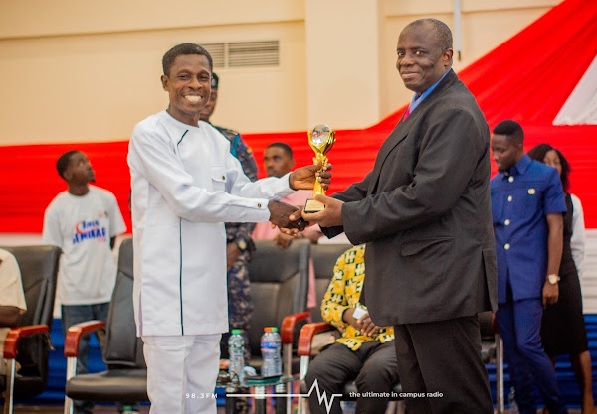The leadership of the Level 200 students at the University of Education, Winneba (UEW) organized a one-day seminar aimed at empowering students on contemporary legal challenges in Ghana.
Held on Friday, March 28, at the Centre for African Studies, the seminar was designed for students enrolled in African Studies courses, including Negotiation, Contemporary Issues in Ghanaian Law, and Effective Parenting.
The event was themed: "Advancing Justice and Equity: Addressing Gender Inequality, Protecting Children's Rights, and Navigating Contemporary Legal Challenges in Ghana."
The seminar brought together heads of departments and lecturers, including the youngest Professor in IT and Computing, Prof. Delali Kwasi Dake, the chairman for the seminar, Dr Seth Tweneboah, Lecturer, UEW, Dr Latifa, lecturer, school of performing Arts, UEW, Prof. Alfred Kuranchie, HOD, Centre for African Studies, UEW and Prof. Ishmael Yaw Dadson, Vice Dean Faculty of Social Sciences Education.
Guest speaker
Speaking at the event, Appeal Court Judge Justice Dennis Dominic Adjei addressed a range of topics, including Alternative Dispute Resolution, the rights of infants, children, young people, and adults, parenting duties, adoption, and surrogate parenthood.
In his enlightening presentation, Justice Adjei clarified that while Ghana has various divisions, there is only one Court of Appeal. He emphasized that the same applies to the High Courts, though there is only one Supreme Court.
Touching on contemporary Ghanaian law, Justice Adjei explained how individuals are categorized under the law. These categories include:
- Infants (doli in capax) — those under 12 years old,
- Juveniles — between 12 and 18 years,
- Young persons — from 18 to 21 years, and
- Adults — 21 years and above.
He further discussed the crimes and corresponding punishments for each category. For individuals under 12, he noted that they cannot be charged with any criminal offence, referencing Section 26 of the Criminal Offences Act.
![]()
“As infants doli in capax, they lack the mental capacity to commit a crime,” he explained.
On juveniles, Justice Adjei highlighted that individuals in this age group who are in conflict with the law are not imprisoned but instead placed in correctional centres. He specified that juveniles aged 15 but under 18 are sent to senior correctional centres, while adults who break the law are incarcerated in prisons.
Turning to the topic of effective parenting, Justice Adjei affirmed that parenting is a continuous process. He explained that one of its primary functions is to nurture children to become autonomous and self-confident.
He also outlined the different types of parents: biological parents, surrogate parents, adoptive parents, foster parents, and legal guardians.
To conclude his presentation, he passionately discussed the acquisition of property under Ghanaian law, particularly focusing on the Intestate Succession Law (PNDC Law III, 1985). He encouraged the students and attendees to understand that this law exists to protect the inheritance or succession rights of Ghanaians.
![]()
Justice Adjei pointed out that any Ghanaian citizen under the age of 18 has the right to inherit the property of their deceased parents, regardless of the relationship between them at the time of death.
Welcome address
In his welcome address, Dr. Maxwell Acheampong, a lecturer and host of the seminar, congratulated the students for successfully completing training in entrepreneurship, as well as acquiring valuable skills in AI, website design, financial management, and business proposal writing.
He encouraged the student entrepreneurs to build solutions to everyday problems, improving lives in the process.
Awards
The guest speaker, Justice Dennis Dominic Adjei, was presented with the "Pillar of Global Justice Award" for his fair discharge of duties and unwavering commitment to upholding the law.
Prof. Delali Kwasi Dake was also recognized with an award for his efforts in empowering students to work hard and pursue their entrepreneurial ambitions.
Certificates of Appreciation were presented to student-mothers from the Effective Parenting class for their exemplary parenting and academic performance.
Finally, a grant was presented to 11 student entrepreneurs on campus to support the growth of their businesses. The grant was funded by Mrs. Abigail Agyeiwaa Acheampong, President of ABIMAX Foundation and wife of Dr Maxwell Acheampong.

